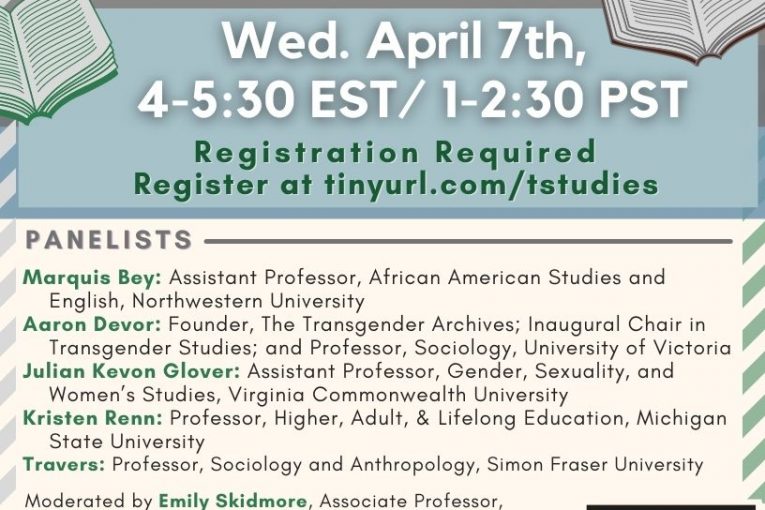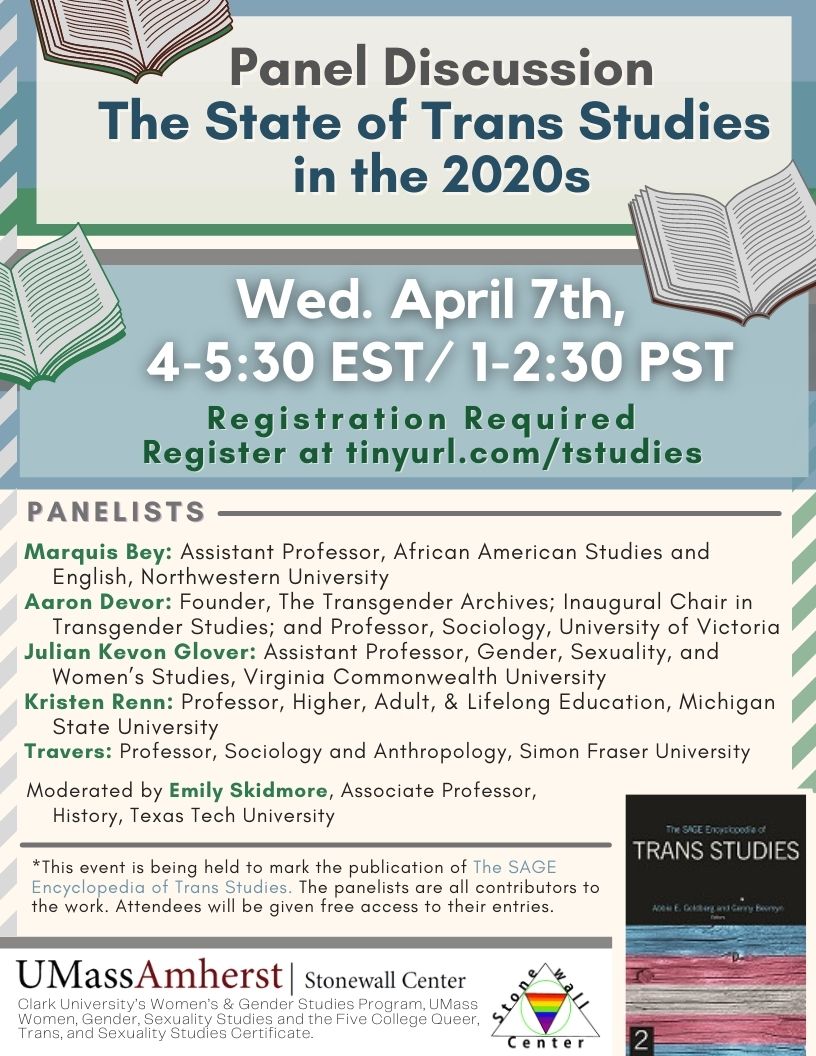

By Nora Lelivelt
On Wednesday, the State of Trans Studies in the 2020s panel discussion was held through a webinar, featuring five panelists.
The trans studies panel was sponsored by Clark University and UMass Amherst to mark the publication of “The SAGE Encyclopedia of Trans Studies,” edited by Abbie Goldberg and Genny Beemyn. All of the panelists are contributors to the work.
Trans studies refers to research about people who identify as transgender, and the work is linked to the LGBTQIA+ community, but specifically, those who are trans.
This event highlighted the current state and work being done in the field of trans studies, where future studies may lead, and how trans studies be made more accessible to a wider audience.
Panelists included Marquis Bey, assistant professor at Northwestern University; Aaron Devor, founder and inaugural chair in transgender studies and professor at the University of Victoria; Julian Glover, assistant professor at Virginia Commonwealth University; Kristen Renn, professor at Michigan State University and Travers, professor at Simon Fraser University. Panelists’ answers to the proposed questions will follow in this respective order.
What, in your mind, is the current state in the field of trans studies? What questions do you see as animating the current discussions and debates?
Bey kicked off the discussion by proposing the question that is often associated with the trans community: “What does it mean to have a certain kind of body? Because the notion of materiality looks toward a different modality of being in relation to one another on the grounds that are not constituted by normality.”
Devor brought up another point very relevant to the community, saying, “In my experience, the field is marginalized. We have to try twice as hard because there are no departments of trans studies. We have to make the case ourselves that it really is scholarly… I’m also excited to see more attention toward the issues of non-binary children and gender-diverse children.”
Glover responded similarly to Bey, as they view the trans community as “beginning to turn away from investigating notions of identity and [instead] understanding embodiment, which will give more room to think about how these ideas of a self-image may change over time.”
Renn and Travers took a slightly different approach when answering the prompt, as their specialization of trans studies is within education and physical recreation for trans kids, respectively.
Renn said, “There is a full array of trans studies and there is new visibility and more applications of previous research into education policies.”
Travers said, “Currently, trans kids’ access to respect, support, healthcare and participation in sports and physical recreation is being highly contested. And this is embedded in a larger system of oppression.”
In regards to the future of the field, where do you think trans studies need to go next? What questions do you think have not been fully explored or addressed as of yet?
Bey spoke upon the future of gender identity, as he hopes trans studies will “think about non-binary as not a particular possessed definition of what gender you are related to, but what gender might mean, and now gender could undermine subverted reconfiguration; there’s not a lot of literature out there regarding this.”
Devor spoke on the lack of inclusive language and being wary of calling people out.
“One danger is of scholars in the area to become enmeshed in a kind of intellectual echo chamber by just talking to one another. There is still a lot of work to be done to pay attention to the practitioners that are trying to be helpful. There’s a lot of calling out on people, [but] instead of calling them out we need to call them in and build on the differences. [The field needs to] build more alliances and be activists outside of the trans studies echo chamber,” Devor said.
Glover brought up two simultaneously important points. “There is a lot of focus on being accepted or seeking recognition from institutions, but there is so much more beyond that. [For example], developing life practices that allow us space and time to invest in ourselves… Additionally, everybody in trans studies needs to deal with their relationship to blackness: not just the black folk. That’s what feels very very important whether you are black or not.”
Renn hopes the future of trans studies will become more accessible to a wider audience.
“Radical inclusion across age, by using… the ideas, voices and values of trans youth and by making our ideas more accessible and a little less locked in academics,” Renn said.
Travers spoke on “the disproportionate inclusion of trans scholars who are white, economically privileged, masculine abled and from the global north.”
Travers said, “It is a real tension in contemporary political movements. I would like to see trans studies continue to focus on how we change unjust institutions, fight harm reduction and support more vulnerable scholars.”
How can trans studies be made accessible to a wider audience?
As a parting question, a webinar attendee asked how trans studies can be made accessible. A few of the panelists responded with advice.
Devor suggested to “use plain English and avoid jargon that makes it less accessible to those outside of the academic community.”
Travers built upon this suggestion, providing some background, “often the elitism of the academy lacks the ability to recruit from a wider body of scholars, [so] pay attention to who gets to construct the field.”
Bey agreed and proposed to begin “engaging those [in reference to young people] who give us glimpses of knowledge and visions of the future.”
To read more information about the current state of trans studies, view the newly published book, “The SAGE Encyclopedia of Trans Studies.”
 Nora Lelivelt is a fourth-year Cell Biology major at UC Davis, also minoring in Professional Writing and Biodiversity.
Nora Lelivelt is a fourth-year Cell Biology major at UC Davis, also minoring in Professional Writing and Biodiversity.
Support our work – to become a sustaining at $5 – $10- $25 per month hit the link:

It “means” that you might be able to have children, you might be able to lift more weight, etc. Oh – and grow a beard, or possibly lose your hair. Or, possible increased susceptibility to hip fractures, with age. (With a wide range even “within” genders.)
Huh?
Again, huh?
And again, huh?
Well, they’re not off to a good start.
Not yet, anyway. 🙂
Ron O… although I seldom agree with you, your style, etc., I believe credit should be given where credit is due…
9.4 on a scale of 10, on your 12:16 post…
Enjoy the sunshine today, be well…
RO, that post was very Alan-Miller-esque. Had I read it first, I would have made the same connection on the jargon and the irony of the comment to use less jargon. It was like a set up. I’m not even sure this is jargon it’s so jargon — could it be “SUPER JARGON” ?